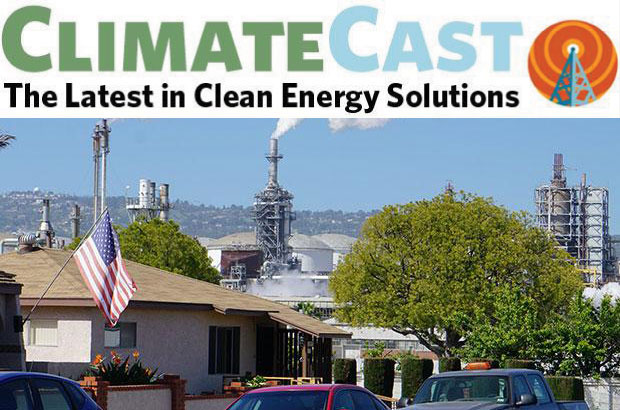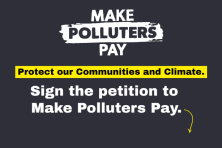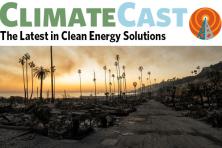Young Women Empowered
In the spirit of community and solidarity with other organizations doing good, we at Climate Solutions wanted to showcase an organization doing some real good. Young Women Empowered’s mission is to cultivate “the power of diverse young women* to be creative leaders and courageous changemakers through transformative programs within a collaborative community of belonging.” We recently had a chance to ask Reagan Jackson (she/her) Co-Executive Director, and Neli Jasuja (she/they), Environmental Justice Programs Manager, a few questions about the group’s work.
CS: Can you tell me why you work on climate justice?
R: I want people to live on this planet! Helping young people have agency to address climate grief and anxiety by working with the earth, healing, and connecting relationships. Being able to talk about the relationship to land as a black person and have some type of reclamation is a big reason why.
N: I grew up in the Bay area, with lots of opportunities to engage in green spaces, but I was also a kid of immigrants, and that meant we were steered towards big-brain jobs away from the land. In my early 20s, I developed chronic pain, and reconnecting with the land and working in farming became a way to heal. Being in a relationship with land, connecting the trauma of immigration and the trauma of being forced away from land, participating in this space was healing. Helping other people of color connect with land was part of the healing for all.
CS: What does climate justice have to do with black history or black futures?
R: Only everything! Starting with history. Telling the story of the diaspora, of how folks were forcibly removed from their homes and taken to this one. Our relationship to this land and to this climate has been fraught with kidnapping, murder and slavery. And in other ways I think about stories like Harriet Tubman, who led folks 90 miles by foot to freedom. That’s usually my answer when folks say black people don't hike, what about Harriet Tubman? The O.G. hiker for liberation. There’s a history of black revolutionaries utilizing the land and nature as safe havens, as a point of liberation. Yanga, in modern-day Mexico, successfully led people to freedom for 30 years.
When I think about black futures, I go back to my original answer, I want black kids to have a future and a planet. I look at all the climate injustice that’s taking place, where is the dumpster, where is the landfill, where are those power lines, where is the flight path for Boeing, why is it in south Seattle and not the north end? All of those things are both our history and our feud. How are we going to be able to live with our health impacts?
N: Recently, I was testifying for (Washington State’s) CURB Act, which essentially calls for restricted permitting for pollution in industrial areas that are already overburdened. Tracing it to the history of redlining where those lines still lay out where the incinerators and landfills are. Our Mara Farm in South Park is a stone's throw away from an EPA superfund site, and South Park experiences the highest rate of child hospitalizations for asthma, so it's all connected in the present tense. It isn’t a coincidence that these communities are people of color. For me, climate justice means addressing this. At Mara Farms, we work hard to grow foods that are safe for our communities to consume. We aren't relying on larger systems to support us because they historically haven't. We develop skills for interdependence in the community to fill the needs of the community. Not only do we grow our own food and distribute it, but we learn woodworking, soil remediation, mycology, etc. The relationship with nature and land is inherent, and there is so much genius from our ancestors on how to take care of it. It isn’t a coincidence who was kidnapped to work the land. I want members of the black community and folks of different cultures to carry that legacy of knowledge forward.
CS: How do you envision a climate-just future?
R: My gut response is twofold. One is that pathway of divestment and us taking care of each other; and tooling up all the people in our communities to be able to do the on-the-ground work that's necessary for creating our own food systems, and finding more equitable ways of doing commerce, doing business. And the other piece is working with everyone else through advocacy, pushing politicians to clean our air and water because I don’t want to live on Mars! We're smart enough to have the technology and the investment to do it… if we stop allowing white supremacist patriarchy to run every damn thing. Regardless, there's definitely gonna be a change that's coming, and my hope is to position our young people to be at the forefront of that change and to have agency over it.
N: A future where our systems don't rely on the violation of people and our planet. Our liberation is tied together.
Thank you to Reagan and Neli for taking the time to share with us at Climate Solutions. If you are so inclined we invite folks to show support to this amazing organization working to improve the lives of young people by following this link!
* those who identify as women or girls or were assigned female at birth
Biden administration pauses new gas exports
This month the Biden administration announced a ”pause” on new projects to export liquified natural gas (LNG), an extremely potent climate pollutant. The move earned immediate praise from climate advocates who had long been calling for a moratorium on further expanding gas production; 350.org founder Bill McKibben credited Biden with “halting the biggest fossil fuel expansion on earth.”
Hyperbole? Maybe, but McKibben’s praise had nothing on the angry critiques that fossil fuel industry leaders and congressional Republicans quickly issued, charging that pausing new LNG exports would imperil US national security and threaten international order. These criticisms echoed calls to increase gas production and exports in the aftermath of Russia’s invitations of Ukraine, when European nations recognized the need to reduce their dependence on Russian gas imports. This week, the American Petroleum Institute called the LNG export pause “a win for Russia;" the Wall Street Journal took things a step further and called the move Biden’s “most destructive climate act."
But the moratorium on new projects only affects new projects that wouldn’t come online for years down the road, as climate scientist Leah Stokes points out—just 17 proposed projects, while the US is already the world’s largest LNG exporter. In fact, US exports of LNG are expected to increase anyway over the next few years, leading the Institute for Energy Economics to reflect that energy-security “concerns about the US LNG pause…are overblown.”
European demand for gas, on the other hand, is tempered by the fact that countries are rapidly turning to alternative heating systems like heat pumps. The same is true in Japan and Korea, the largest international buyers for new US gas export projects.
Arguing that slowing growth in LNG exports will cripple the US economy, the GOP-led House passed a bill last week to reverse the ban on new LNG exports (the measure has little chance of becoming law). In reality, according to an Energy Innovation analysis, COMPLETING new proposed LNG export projects would risk raising energy prices for American consumers.
As Leah Stokes observes, there is already far too much gas being extracted and exported. Investment in new LNG capacity is, in light of the worsening climate crisis, deeply cynical. As has long been clear, such investments amount to a bet that governments will continue to dither and delay on action to transition away from fossil fuels, and an investment in accelerating the predictable, increasingly destructive outcomes of climate change. The ever-indispensable Yale Climate Connections has more on the climate threat posed by LNG production, and a summary of why Biden’s “pause” is arguably a big deal.
One thing you can do
Oregon and Washington folks! Our legislative sessions are in their final weeks, and your voice is key to the success of priority clean energy legislation. Visit Climate Solutions’ new-and-improved Action Center for current opportunities to contact your lawmakers!
What we’re listening to
Workers' rights and climate justice go hand in hand. Listen to Environmental justice advocate Payton M. Wilkins speak on how unions will keep bread on workers' tables for the green jobs transition. A just transition starts with a conversation. Wilkins wants to remove the false choice between making a living and living in a safe environment. You can have both, and unions as an institution are part of the solution.





